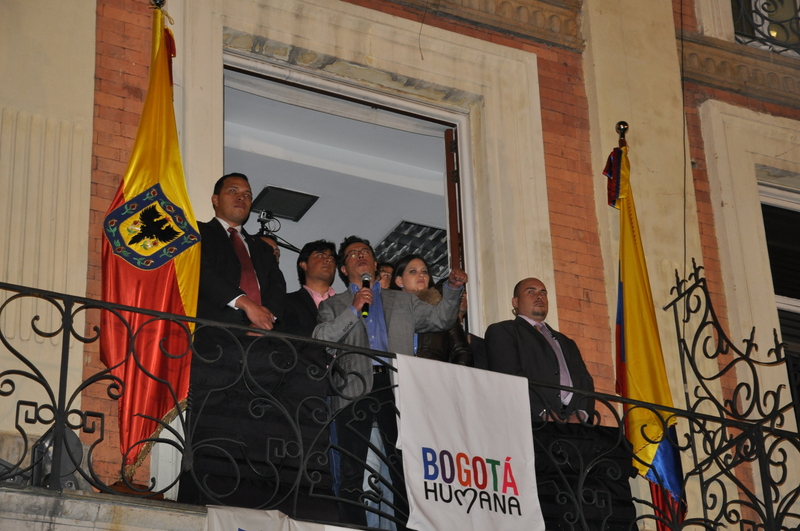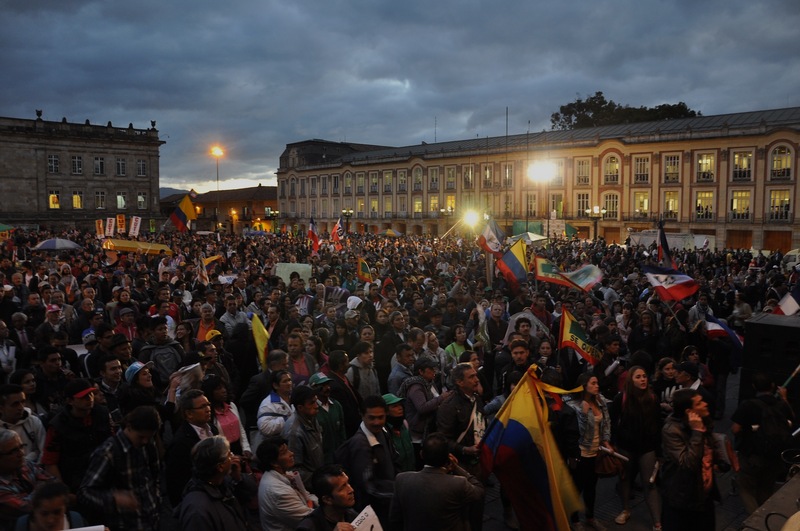
President Santos during the announcement of the dismissal of Petro as mayor of Bogotá. 19 March, 2014. Photo by Latin America Photojournalism, copyright Demotix.
President Juan Manuel Santos confirmed the dismissal of Gustavo Petro as mayor of Bogotá after rejecting the ruling by the Inter-American Commission on Human Rights (IACHR) for Petro to continue in office. The IACHR granted precautionary measures in favor of Petro after the State Council rejected several writs of protection to stop the dismissal of the now former mayor of Bogotá.
“I have to proceed in accordance with the Constitution and the law,” said Santos when he addressed the nation to confirm the removal of Petro which had been ordered in December 2013 by Attorney General Alejandro Ordóñez Maldonado. Santos appointed Labor Minister Rafael Pardo to replace Petro, adding that the ousted mayor had had every opportunity to defend himself before the Colombian justice system.
Meanwhile, the IACHR scheduled a hearing on this case that Colombia does not plan to attend.
Given his dismissal, which leaves him ineligible politically for 15 years, Petro recalled that the President had publicly announced that “if the precautionary measures are favorable, they will be respected.” Petro said that “the President of Colombia lied” and described the decision to dismiss him as a coup d’etat because his appointment was an elected position.
Petro will introduce new writs, and called on his supporters to mobilize a constituent assembly. Security measures were redoubled because of thousands of people heading towards the presidential palace and they are on alert for new public demonstrations.
On Twitter, the tags #ChaoPetro, #DestituciónPetro, #FuerzaPetro are some of the most used:
#DestituciónPetro sin duda alguna este gobierno el poder está en manos de unas pocas personas que pertenen a la clase social privilegiada
— NANDO (@JUFERMUR) marzo 20, 2014
There’s no doubt that this government is in the hands of just a few from the privileged class
¿Qué autoridad le queda a Colombia para criticar a aquellos países, que como Venezuela y Ecuador, desacatan la CIDH?
— Manuel Rodríguez B. (@manuel_rodb) marzo 20, 2014
By what authority does Colombia criticize countries like Venezuela and Ecuador, flouting the IACHR?
Tengo el honor de conocer a @petrogustavo es un hombre honesto muy trabajador que no se merece 15 años de inhabilidad, que dolor tan grande
— Diana Marcela Otavo (@dianamotavo) marzo 21, 2014
I have the honor of knowing Petro [he] is a hard working honest man who does not deserve 15 years of ineligibility, what a shame
¿Y si la CIDH no tiene competencia por qué el Procurador Ordónez fue a Washington a hacer lobby en contra de Petro?
— Daniel Coronell (@DCoronell) marzo 19, 2014
If the IACHR has no power, why did Attorney General Ordóñez go to Washington to lobby against Petro?
Others were pleased with the government's decision:
Hoy con mucha felicidad puedo decir #chaopetro — Andre Kass (@andrecasadu) marzo 20, 2014
Today with much joy I can say ‘ciao Petro’
Esta noche me voy a dormir con una sonrisa de #ChaoPetro en mi linda carita. Que duerman! — Mónica Mojica (@MoniMojica) marzo 20, 2014
Tonight I’ll sleep with a smile of ‘ciao Petro’ on my pretty little face. Sleep well.
Viva El Consejo de Estado, Viva Alfonso Vargas, Viva El Procurador Ordóñez. #ChaoPetro.
— Camilo Andrés (@camilofz45) marzo 18, 2014
Viva State Council, viva Alfonso Vargas, viva Attorney General Ordóñez
While some, like Jorge Vivas, call for harmony:
Nada bueno sale de la polarización frente al tema #DestitucionPetro. El odio entre hermanos es la raíz de la tiranía. Venga de donde venga.
— Jorge Vivas (@yorchvivas) marzo 20, 2014
Nothing good comes from the polarization on the issue. Hatred between brothers is the root of tyranny. Wherever you come from.
For his part, Petro is still using his Twitter account. There he recalls what happened 40 years ago with another one of the country’s leaders, Jorge Eliecer Gaitán, who was also removed:
Historia que debemos recordar . pic.twitter.com/jnEDPsUuUF
— Gustavo Petro (@petrogustavo) marzo 20, 2014
History we should remember.
Gustavo Bolivar in his blog Sin Censura [es] is outraged and stresses the “bandidocracia” as synonymous with corruption and theft:
Con la decisión del Presidente Santos queda claro, clarísimo, que no hay otra forma de gobernar, sin provocar la furia implacable de las mafias del poder, distinta a la bandidocracia. El gobierno de los hampones. El mensaje es claro: O robas y dejas robar, o no tienes posibilidades, o te perseguimos, o te hacemos gavilla y te sacamos.
With President Santos’ decision, it’s clear, very clear, that there is no other way of governing without provoking the relentless fury of the mafias of power, other than the bandidocracia. The government of thugs. The message is clear: Either you steal and let steal, or you have no chance, or we’ll harass you, or we’ll just throw you out.
Bolivar finishes up with the consequences that the dismissal may have on government interests, democracy and the peace process:
Este día pasará ala historia como la fecha infame en la que el Presidente Santos mató la justicia, mató la democracia y se mató él mismo. Porque es claro que su canallada, su solidaridad con las fuerzas oscuras que manipulan el poder le costará su reelección. Estamos tristes, estamos furiosos. (Ojo con la rabia Presidente). Aún así seguimos creyendo en la paz y, si no media otro fraude electoral, vamos a cobrar en las urnas su atrevimiento. Vamos a triplicar esfuerzos por hacerle ver al país, hoy más que nunca, que el voto en blanco tiene un valor de protesta enorme contra lo que usted representa. Ojo con la rabia, Presidente. Usted acaba de cerrarle el camino a la democracia y sin democracia no hay paz, sin Justicia no hay Paz, sin honestidad no hay Paz. Las tres premisas violadas por el Presidente Santos esta noche, deben retumbar en la Habana. Esta paz es pura retórica electoral.
This day will go down in history as the infamous date that President Santos killed democracy, and himself. Because it’s clear that his villainy, his joining the dark forces that manipulate power will cost him the re-election. We are sad, we are furious. Beware the fury, Mr. President. Yet we still believe in peace and if there is no other electoral fraud, we will collect your audacity at the ballot box. We will triple our efforts to make the country see that, today more than ever, the blank ballot has an enormous power of protest against what you represent. Beware the fury, Mr. President. You have just closed the road to democracy, and without democracy there is no peace, without justice there is no peace, without honesty there is no peace. The three premises violated by President Santos tonight should reverberate in Havana. This peace is pure electoral rhetoric.

Petro’s followers listen to his speech at the Bolivar Plaza in Bogotá. March, 2014. Photo by Latin America Photojournalism, copyright Demotix.
In Las 2 Orillas [es] Petro’s future is discussed:
Desde mañana Petro se convertirá en el gran impulsor de una nueva Constituyente que busque recuperar el espíritu primigenio de la Constitución del 91 de una apertura democrática que éste ve como condición necesaria para que Colombia finalmente alcance la paz. Petro se ve a sí mismo como el vocero de la generación de la paz de Colombia y planteó de manera radical que “Santos no es un defensor legítimo de esa bandera. Si no fue capaz de defender la presencia de un mandatario elegido democráticamente, que puede esperarse de con la defensa de los derechos de unos alzados en armas que entren a un proceso de paz.”
En este nuevo escenario Gustavo Petro dejaría el espacio de Bogotá para buscar el escenario nacional.
After tomorrow, Petro becomes the driving force of a new Constituent seeking to recover the original spirit of the Constitution of ’91 for an open democracy that he sees as necessary to finally achieve peace. Petro sees himself as the spokesman for the generation of peace in Colombia and he radically proposed that “Santos is not a legitimate defender of that flag. If he was not able to defend the presence of a democratically elected representative, what can we expect […] when it comes to defending the rights of rebels who have taken up arms entering a peace process.”
In this new scenario, Gustavo Petro will leave Bogotá to seek a national stage.
They conclude:
No está claro cual será el resultado final para Juan Manuel Santos con esta decisión pero lo que está claro es que el tema Petro aún no concluye. Habrá Petro para largo y su activismo podría modificar el mapa electoral de las elecciones presidenciales.
It is unclear what the final result will be for Juan Manuel Santos with this decision, but what is clear is that the subject of Petro isn’t over yet. Petro will be around for the long haul and his activism could change the electoral map for the presidential elections.
Bogotá will elect [es] a new mayor in June 2014.






